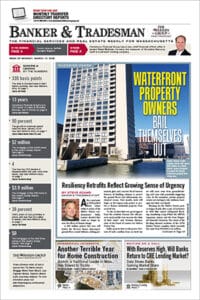
Spilka, Rodrigues discuss end of formal sessions Senate President Karen Spilka (left) speaks about the end of formal lawmaking business on the morning of Aug. 1, 2024. Photo by Chris Lisinski | State House News Service
The only political jobs worth having are president, governor, and mayor, because the officeholder can get things done, the late Boston Mayor Kevin White often said.
But there are limits, such as City Hall needing Beacon Hill sign-off for local bills known as home rule petitions. State House lawmakers made that clear last week when they ended formal sessions for the year without taking up several such bills, and dealt a big blow to Boston Mayor Michelle Wu and her top legislative priority.
On Tuesday, that blow was compounded by a sharp jab at the mayor from Senate President Karen Spilka after Wu suggested Boston homeowners would have the Senate to blame if state lawmakers don’t return to Beacon Hill to take up the proposal in a special session before the end of the year.
With the backing of the City Council and unions representing residents, Wu had asked lawmakers to pass a bill that would temporarily shift more of the city’s property tax burden onto commercial real estate owners as a way to mitigate a potential spike in residential tax bills next year. Without such action, the city is projecting a steep increase in residential bills to make up for declining commercial values. The commercial property slump is the result of high vacancy rates from the move to hybrid work patterns.
Business groups lobbied hard to kill the bill, arguing it would put added pressure on an already-ailing office sector. Large Boston commercial landlords, who are not often seen on Beacon Hill, turned up at fundraisers in the days before the end of formal sessions.
The House, where Wu has several allies, including House Ways and Means chairman Aaron Michlewitz, passed the proposal in a 132-24 roll call vote in the closing days of the session. But the bill stalled in the Senate.
Wu: Blame Senate If Your Taxes Rise
The prospects of its potential passage in the coming months grew even dimmer on Tuesday, after Spilka hit back at Wu for saying residents will be notified their taxes are going up due to senators failing to take up the bill. Wu made the comments during her regular appearance on GBH’s “Boston Public Radio” show.
Wu said she hoped that lawmakers will still take the extraordinary step of reconvening a formal session, as legislative leaders have indicated they are considering for a multibillion-dollar economic development bill pushed by Gov. Maura Healey. They could take up the tax shift bill during that session, Wu said.
“If this does not happen every single resident will know that their taxes are going up because the Senate did not vote through that last step,” Wu said.
Cue the fierce pushback from Spilka.
“Blaming the Senate may be politically convenient for the Mayor, but it does nothing to improve a policy proposal that has been widely questioned by fiscal watchdog agencies and could do serious damage to Boston’s economy,” Spilka said through a spokesperson. “The Senate President has received no indication that there is sufficient support among Senators for this policy proposal to move forward.”
A source familiar with discussions said most Boston senators were on board with the tax shift but did not provide names. Boston has six senators out of the total of 40 in the chamber.
Left Behind in Late-Night Legislating
Because of the way power is concentrated on Beacon Hill, most lawmakers on the night of July 31 and in the early morning of Aug. 1 sat in their respective chambers or offices, and strolled the hallways as their leaders negotiated various pieces of legislation, including a $5.1 billion housing bill. Asked by a reporter about Boston’s property tax bill, Sen. Nick Collins, who represents South Boston and Dorchester, was mum and quickly scrambled back inside the Senate chamber.
As Wednesday night turned into Thursday morning, one senator appeared to be asleep at her desk in the Senate chamber. Various bills were left on the cutting room floor, housing and veterans legislation among the notable exceptions that got approved.
“I have no idea what folks at the State House are thinking,” said Carlos Aramayo, president of UNITE HERE Local 26, which represents hospitality workers and backed Wu’s tax shift. The Boston Police Patrolmen’s Association, another union, also lobbied lawmakers to support the bill.
“When residents get their property tax bills in the city of Boston, or frankly when renters’ rents go up, folks are going to be mad at somebody,” Aramayo said. “From my perspective, Mayor Wu was trying to do the right thing.”
Strong Pushback from Developers
On the other side, the public relations firm run by George Regan, who has clashed with Wu, kept up a steady stream of emails at the end of session raising alarms about the proposal.
As the proposal was about to clear the House last Tuesday, NAIOP Massachusetts, the commercial estate development association, said its community is facing “unprecedented challenges with vacancies on the rise and an uncertain future” that would be worsened by the tax shift.
“Recognizing the negative ripple effect that this proposal could have on the Commonwealth, NAIOP urges the Senate not to advance this legislation,” Tamara Small, its CEO, said in a statement.
A week later, in the hours after Wu and Spilka traded jabs, a think tank that has previously fought with the mayor over the tax plan said declining office values remain a concern.
“This is an issue that will continue to face Boston and the Commonwealth for many years to come, and if solutions are going to be found it is vital that the Wu administration provide more public information about the actual state of Boston’s finances,” Greg Maynard, the executive director of the Boston Policy Institute, said in his own statement.
This article first appeared on CommonWealth Beacon and is republished here under a Creative Commons license.![]()






